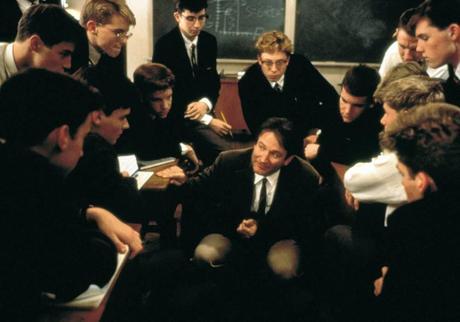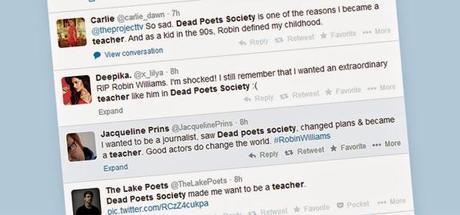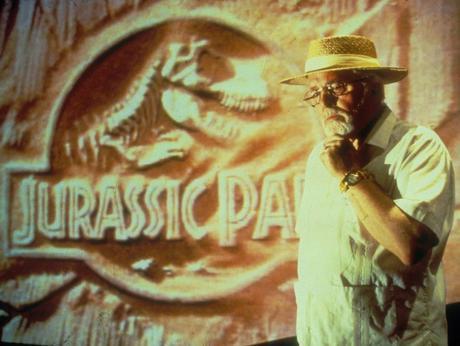Sniff. I've been moved, repeatedly, by movies and movie scenes and by the fictional characters and personalities that govern the directions they usually go.So when Robin Williams died a couple of weeks back, I shut the door for my room upstairs, climbed up the chair and silently whispered 'Oh captain, my captain' into the air. Just before I drowned my face into the pillow and slept off, depressed. But that depression was nothing in comparison to the one that Williams must have felt.Robin Williams has been a big inspiration to me through his movie Dead Poets Society. I think the timing of my watching the movie was perfect. I was 19 years old, in my first year at university in Vellore, India and was living away from home. I saw the Dead Poets Society illegally, on on the internet, as is the trend in India. I'm not proud of it. The film – directed by Peter Weir and written by Tom Schulman – depicted a world very similar to mine. It was set in Vermont in 1959. Welton Academy – the elite private boys school featured in the film – and reminded me repeatedly with the middle school and high school that I had attended.

Image Courtesy: http://flavorwire.files.wordpress.com/2014/02/dead-poets-society1.jpg
As I watched the movie further, the parallels between my life and theirs became more apparent. Neil Perry, Todd Anderson and the other students endured constraints that seemed very familiar. In an early scene the boys are reminded of the four pillars that were the foundation to a Welton education: tradition, honour, excellence and discipline. Those were the same pillars that had shaped my education. I, like the students in Dead Poets Society, felt weighed down under the fearsome load of duty and obligation. Perhaps that's why I was captivated by Robin Williams's portrayal of John Keating, the unorthodox teacher who harnesses the power of literature to open his pupils' minds. Watching Williams's performance I found myself wishing my teachers had been as inspiring. I did find a few. It is through Keating – and he was based on a real teacher who had taught screenwriter Tom Schulman – that the boys slowly learn to emerge from under the shadow of expectation. That theme resonated with me.In junior school, I have had the privilege of being taught by a teacher who, if not as inspiring as Keating, was equally responsible for motivating me to pursue what I ended up doing. For the sake of progression, I'm not revealing what they are now. He was an old man, retired but recalled to active teaching, because the school was short of quality teachers back then. He taught the 'life sciences' to us, but I would like to claim that he taught us much more.He used to say that we need to look beyond what the words in the texts merely mean. I ended up doing the same thing when I would be tutoring a couple of first-years later. 'Before you get what endomitosis and exocytosis mean, you need to understand what those endo- and exo- and infra- and intra- mean!' I used to tell them, as they'd otherwise expect my readily available notes.This teacher once gave an example of how etymology is sometimes more important for retention before anything we learn in science or humanities or art. He asked us if we knew where the name LUFTHANSA came from. For the airlines, that is. Quite obviously, we didn't know. He explained how it being the German flagship carrier, derives it's name from the ancient Aryan language of Sanskrit. We were all like shut the front door! But he explained patiently. We can say that LUFTHANSA can be broken up as LUFT + HANSA. While LUFT needed a little more contortion, HANSA is the Sanskrit word for Swan. LUFT or more commonly, LUPT, is a word that either means extinct or the expression of 'fading away from apparent view'. So when put together, LUFTHANSA may actually signify the serene image of a graceful Swan that is fading away from apparent view as it flies beyond the clouds. Just like an aeroplane.Beautiful, isn't it? I used the etymology-thing frequently in science years later and boy, that has been helpful!
Image Courtesy: http://www.bbc.com/news/magazine-28756375
I have always hated how the youth in India first become engineers and then decide to pursue what they really want to do in life. Some young minds don't realize that until they're way into their 30s. Most of them just blindly follow the trend as a herd. I hate precisely that. I hate pursuing some predetermined set of rules blindly and not applying my head into what I'm doing. Robin Williams's character from Dead Poets Society, John Keating, had the greatest impact on me as I decided to get into academics and inspire kids to go beyond the norms and break barriers.Keating ushers his young pupils towards the black–and–white photographs displayed in a glass cabinet of former pupils of the school. "They're not that different from you, are they?" he says as the camera slowly pans from the faces in the photograph to the boys in his class. "Same haircuts. Full of hormones, just like you. Invincible, just like you feel.. They believe they're destined for great things, just like many of you, their eyes are full of hope, just like you.. these boys are now fertilizing daffodils. But if you listen real close, you can hear them whisper their legacy to you.. Carpe diem, seize the day boys, make your lives extraordinary!"The other guy who reassuredly put my head to pursue biological science was Michael Crichton, through the voice of Richard Attenborough as the ambitious billionaire John Hammond in Jurassic Park.Just how enthralled were you when John Hammond explained (in a little too simple ways) through the amusing A/V ride, the intricate details of molecular cloning by mixing amphibian DNA and dinosaur DNA that was found from within a mosquito fossil, trapped for centuries within amber? I immediately decided to read the book which I eventually found more exciting and found for the first time difficult words like automated gene sequencers and hormonal manipulation. I'd say it was love at first sight!

Image Courtesy: http://www.blogcdn.com/slideshows/images/slides/436/2/S4362/l.jpg?v=1
But before the books, what gripped my attention was the enthusiasm of the man with the eccentric and outlandish vision of building a dinosaur theme park with live dinosaurs in it. It is said that Spielberg chose the genius director Attenborough to play John Hammond because he apparently required someone to portray the similar kind of motherly affection and protection towards his project as any good director would, towards his/her movie. And it was that enthusiasm that caught my attention, to further the inspirational move towards biological science and specifically molecular biology.I'm currently working towards a PhD as a graduate student in one of the finest and the most competitive lab in the world. My project involves deciphering the intricacies of cell cycle and gene regulation. And I aim to procure a teaching position in the future. Ironically, both my cinematic inspirations passed away as I took the very first realistic step towards achieving that goal. That kinda makes me sad.My only hope is for Tom Hanks or Robert Langdon to stay alive and well for as long as he can. Because I love you guys for being my wackily linked inspirations. I will never forget you guys for what you've done for me. May you all rest in peace.